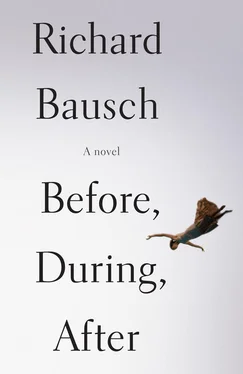Seeing her cringing against the wall next to the shower, with the curtain pulled up to cover the front of her, he thought she looked pitiable, and yet it did not make him feel for her. It made him angrier. He had the urge to flail at her, strike her. But he held himself back, moving slowly into the room. And now, amazingly, he felt a rush of something weirdly like calm purpose and righteousness. There was no need for any thinking. He would show her now; she would know what kind of man he was now. He watched his hands reach to her face, and gently he took hold, his big hands on either side. She was trembling and crying. Tightening his hold, he pressed harder, feeling the cheekbones. Then he shook her. “Stop it. Be quiet. I love you. Can’t you see that?”
“You’re — hurting—” she got out. The wine on his breath was making her sick. Gradually she began losing balance, was unable to stand, being held up by his hands. His hands trembled, squeezing, pressing.
“Look at me. Will you? This is me. This is me .”
She said, “Let go. Let go of me!”
And he did, and she was leaning against the angle of wall and shower stall, still gripping the shower curtain, holding it just under her chin.
“God,” he said. “You — my God.”
“Get out,” she rasped, and then coughed. “Leave me alone.”
“You have to understand,” he told her. But there was nothing he could find to say, nothing he could explain. “I’m s-sorry about the — door,” he said, controlling himself. “I’m sorry about — this.” She covered her face and turned from him, crying.
He was angry all over again. “But you’ve got to understand me. You listening? I don’t want kindness from you. Understand? I don’t want pity.”
“Oh, God,” she said, “Stop it. Stop it. Leave me alone!”
For a moment, they did not speak, standing close in the too-bright light, the door at its appalling angle and the debris at their feet, the only sounds her sobbing and sniffling and his shaken breathing.
“It doesn’t matter,” he said finally. “Everything’s broken. I’m broken. This — you and me. This is broken.”
“No,” she said. “Oh, please ! You don’t know. You don’t know !”
He said, “I know. I know.”
She did not move. And she could not stop crying.
“All right,” he said evenly, thinly, his voice rough and straining. “All right. You want me to leave. That’s what you’ve wanted all along, right? So I’ll leave. I will leave.”
Through the blur of her tears, she saw him draw up as if to reach for her again. She cowered back a little more. “I — don’t — know — wh-what you’re — talking about,” she got out through the sobs and gasping.
“Ah, God,” he said. “Go on, then. Go back to whoever you ran into, okay? Just — go. Why should you stay with me out of — out of —kindness . I’m sick and tired of kindness . You go right ahead. You went to Jamaica and had a high old time and you didn’t know where I was and you were lonely—”
She screamed at him, “I was raped !” The word came in the long top of the scream. “God damn you! I was raped. I was raped.”
He faltered back. Neither of them moved for a time. Again, there was just the sound of their tattered breathing, her crying.
Gasping it out, low, not looking at him, she said, “Oh, God. God!” She straightened, still clutching the shower curtain. And now her voice was bitter and defiant. “Do you get it now?”
They stood there looking into each other’s eyes.
He saw the splintered and bent frame of the door, and the door itself, lying askew across the counter next to the sink. His heart was hammering in his temples, and he took another step back, one hand reaching for the broken frame. “God, baby.”
“Go,” she told him. “Please. Leave me alone. Please.”
He started toward her, but she cowered against the wall and screamed again. “Get away from me!”
Slowly he backed out of the room. “Can we just …” he began.
“Get away,” she said.
“Why didn’t you tell me?”
“Just please leave me alone.”
Searching his mind for some way through, something else occurred to him: “Who — how did it — honey—”
“There’s nothing I have to say to you,” she said. “God! Not now.” She sobbed again. Then, sniffling, more calmly: “We’ll talk in the morning. Please. Please.” The words came with the crying, the struggle for breath.
“But — you can’t just — did you know him? Was he with — where was — where did it happen?”
“Will you please just leave me alone.”
“We can’t just—” he said.
“Yes, we can.” She was crying quietly. “I did.”
“I’ll kill him.”
She said nothing, still stood there with the shower curtain pulled up. When he started toward her she screamed. “Don’t you touch me!”
He went out and got into his car and drove to the Midtown apartment. He let himself in and moved to the little bedroom, where the folding bed still stood in one corner. There was an ache starting in his hip from having kicked at the bathroom door in the little house. He had thought his purpose in life was always to be kind and brave and good, but it was clear to him now that he had wanted more than anything else to be loved. It seemed to him that everything was over, all his plans and hopes, all his dreams and wishes and everything in which he had ever put the slightest faith. Then he thought of her and realized the selfishness of his own grief. He removed his shoes, opened the folding bed, sat down, and looked at his hands.
1
Alone in the house, where the only sound was her crying, she had the vision: If she were a character in a movie, Duego would come back. He would leap out at her from a doorway or climb into the window of the house, and there would be a struggle. He would try to kill her. And she would kill him. The story would be over in a single cathartic moment of action. There would be the usual matters to take care of involving police and the courts and the public eventualities, the explanations. The verdict would be that her action was justified, of course: self-defense. Her life would be saved. Her husband would hold her, and they would forgive each other everything.
But in the story she was living, the hours of the rest of the night went on, while she sat, terrified, on the bed, still crying, and intermittently going to the front door to look out. She did not want him to come back; and at the same time she was afraid he would not do so. She wanted the baby, but what had happened to her glared forth, and made her want to be rid of it — shed it, push it out of herself, and be clean again.
“God,” she said aloud. “No.” And then she repeated it. “No.”
She thought of the sixty to seventy percent who went on with their lives. She imagined them never speaking of it. And nobody noticing anything. It must be that in one way or another they found the strength to make a kind of truce with it. Somehow they succeeded in concealing it, and they smiled and laughed and went with friends and made love and they had no nightmares about it, and nobody was the wiser — or else they did have the nightmares and lived secretive, haunted lives, enduring by some means the anxiety and the scarred sense of themselves, the fear of every change, listening always in the dark, carrying the feeling of trespass and violation but showing the world only the polite, desperate lifting of a hand to wave, like that poor doomed woman in the ruin of the south tower. She worked to put the thought away, afraid that, simply by thinking it, she was depriving the dead person of her dignity. And then she thought of the men who committed these crimes and went on with their own lives, and did it over and over again. And yet too many people, men and women both, considered the thing itself a form of sexual excess, or even, awfully, in some mysteriously habituated way, an unacceptable breech of propriety. The whole culture smacked of it, smelled of it.
Читать дальше












